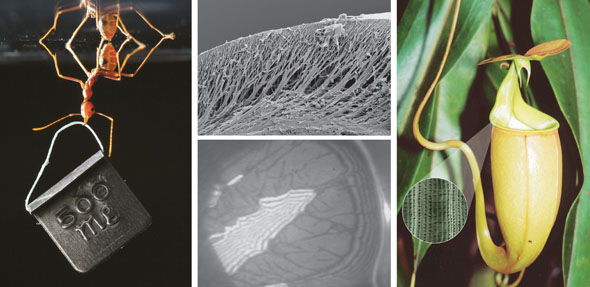
How do animals and plants function mechanically?
Our research aims to explain how animals function and how they are adapted biomechanically for their environments. We investigate how animals attach themselves to the substrate to allow locomotion, as well as the ecological context of attachment mechanisms in a wide range of insect-plant interactions.
Using animals from diverse groups (including insect adults and larvae, arachnids, and gastropods), we study how their attachment systems are designed to solve the conflict between adhesion and locomotion, and what adaptations they have evolved to cope with challenging natural substrates. We study several insect-plant interactions where mechanical factors play a dominant role (including mutualism in Macaranga-ant associations, carnivory in Nepenthes pitcher plants, herbivory in caterpillars, and foraging in leafcutter ants). Apart from field work (mainly in tropical Southeast Asia), our experimental methods and techniques include force measurements at different size scales, morphometry, interference, confocal, and electron microscopy, and high-speed 3D motion analysis.
Current research topics include:
-
Design and function of attachment systems
-
Animal locomotion
-
Biomechanics and ecology of insect-plant interactions
Key Publications
Clemente CJ, Goetzke H, Bullock JMR, Sutton GP, Burrows M & Federle W (2017) Jumping without slipping: leafhoppers (Hemiptera: Cicadellidae) possess special tarsal structures for jumping from smooth surfaces. J. R. Soc. Interface. 14. 20170022.
Labonte D, Clemente CJ, Dittrich A, Kuo C-Y, Crosby AJ, Irschick DJ & Federle W (2016) Extreme positive allometry of animal adhesive pads and the size limits of adhesion-based climbing. Proceedings of the National Academy of Sciences, USA 113, 1297-1302
Zhou, Y., Robinson, A., Steiner, U., Federle, W. (2014): Insect adhesion on rough surfaces: analysis of adhesive contact of smooth and hairy pads on transparent microstructured substrates. J R Soc Interface, 11(98): 20140499
Endlein, T. & Federle, W. (2013): Rapid preflexes in smooth adhesive pads of insects prevent sudden detachment. Proc. R. Soc. B 280(1757): 20122868
Scharmann, M., Thornham, DG., Grafe, TU. & Federle, W. (2012): A novel type of nutritional ant-plant interaction: ant partners of carnivorous pitcher plants prevent nutrient export by dipteran pitcher infauna. PLoS ONE 8(1): e63556

